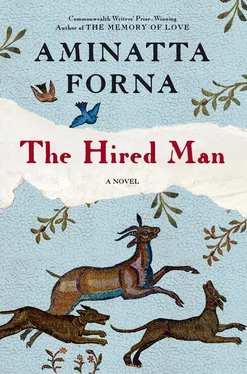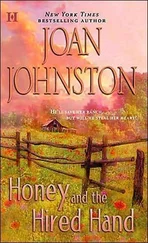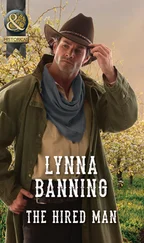‘Hoi,’ I yell from the other side of the road. ‘Mr Buneta!’ (For that is his name.) I run and begin to collect the letters for him. What is he doing? What’s he thinking? The man must be mad. I run back maybe one hundred, maybe two hundred metres, I don’t know, gathering up letters. But he doesn’t seem to notice my efforts, certainly he doesn’t acknowledge them, he doesn’t even slow up so I can hand them back to him. I must pick twenty letters up off the pavements and even though I am the younger man by thirty years, what with so much stopping and bending the distance between us lengthens. Between letters I jog to catch up and flick through the letters I have in my hand. They are letters for people in Gost, with their names and addresses, postmarked and ready for delivery. But surely this guy doesn’t think he’s delivering them. There are a few for people I know. The baker, who has moved on, anyway, so there’s no point delivering it. And Javor. Javor and the baker. Surely this is no coincidence.
Now I sprint to catch him up. ‘Hoi!’ I yell again, waving the letters. This time he stops and when I reach him, I see the man is crying, more than crying, bawling like a child. A big, bandy-legged, red-faced child. He drops all the letters he is carrying, balls his hands into fists and holds his arms stiffly down at his sides. He sniffs and sobs and speaks haltingly and I discover this: that the head of the post office, Javor’s father, has been taken away by the men newly arrived in Gost. Buneta saw it, he jabs a finger at his own red and teary eye. He saw him being put into a grey van, inside which were other men: a restaurant owner, the director of the hospital, the bloke who ran the hardware stores. He saw what was happening, so when they wanted the post office records for the addresses of the others whose names were on their list, he had the idea of taking the letters, so they wouldn’t be able to find them. His plan, as far as he has got, is to take as many letters as he can home and burn them.
All the people to whom the names belong are people who worship at the Orthodox church; the priest’s name is on one of the letters. People who use the word hleb for bread. I bend down and pick up the letters, as many as I can. I force them into every one of my pockets and when they are full I gather an armful, run to the side of the bridge and throw them over the metal railing into the river. I have caught the man’s madness and when I turn round I see him moving slowly away, with the air of a lost toddler.
And then I start to run. I run. Towards the blue house.
I shook my head. I turned away from the window. It was dark now, in my stomach a knot of foreboding tightened. I’d felt it all summer, but now, seeing Fabjan there outside the blue house in the half-darkness, I thought: It’s already happening, things are changing. I am not a religious man, but it seemed to me Laura had been sent here for a reason. I’m not saying that was the case, I’m just saying that was how it seemed at the time, standing there on that particular night, in the place where Fabjan had stood. I could smell burned grass from his cigarette.
Laura arrived in Gost and opened a trapdoor. Beneath the trapdoor was an infinite tunnel and that tunnel led to the past. In the last days of the family’s stay in Gost I seemed to have become trapped in the tunnel, somewhere between a time sixteen years ago and now. When I was a child I had, for a while, been fascinated by Greek myths as it seems to me every boy at some point is. The Minotaur, the monstrous beast created by one betrayal followed by another. Two betrayals: the King of Crete’s betrayal of his god, when he refused to sacrifice the bull sent by Poseidon; the betrayal of the King by his own wife with the same bull, a betrayal which produced the Minotaur himself. So to hide their shame and guilt they built a labyrinth into which they confined the Minotaur. Sometimes I imagined myself as the Minotaur, roaming a maze of tunnels below Gost, the echo of my roars reaching the ears of those who lived under the sun.
I reckoned I had only a few more days’ work on the blue house, it all depended on what Laura decided she wanted to do. A wasps’ nest in the attic would have to come out. The dead tree needed to be cut into logs and they would see me through the winter, but I could do that anytime. Beyond that, the last remaining job was to fix the wall in the front room, everything else could wait. Matthew came by when I was on the ladder and asked if he could help, so I gave him a job preparing the wall, tearing out the crumbling and broken plaster. Meanwhile I wandered out into the yard. Today was Friday, tomorrow it would be exactly four weeks since the family arrived in the last week of July. Such a short time. I stood at the outbuilding door and thought back to the day I’d first seen their car drive into Gost on the road that led from the coast, the way the vehicle seemed to hesitate before the turn, then later finding Laura in the road in front of the house looking for the water mains, our trips together to the swimming hole and to Zadar. The restoration of the mural and the fountain. Krešimir’s rage. So much had changed over those weeks, and yet in many ways the change felt like a return to a past, as though Laura, Matthew and Grace weren’t strangers newly arrived in Gost, but had in some way been here for a long time. They’d be going soon, in a week and a day to be exact. Laura had already begun to talk about how to secure the house when it was empty; I told her she needn’t worry, I’d keep an eye on it. Laura leaned across the table and squeezed my arm and said something she’d said many times: ‘What would we do without you, Duro?’ She told me Matthew and Grace had to get back to school, both of them had important exams in the next year. For Matthew this would be his last year in school and then he’d be leaving home. She had talked about him taking a year off before university or college, to travel, maybe to Africa or India to help the poor.
Inside the outbuilding: the Fićo. The week before I’d managed a good number of hours on it. Then with the death of Kos I had briefly lost interest, but now I made up my mind to have the car working before the family left; I thought of it as my gift to Laura, and in the last few days I’d spent a lot of time thinking about this car and what it would mean to see her drive it.
I heaved open the double doors of the outbuilding. While Laura was out, I wanted to see if I could get the engine running. I’d given the car a thorough going over: cleaning the carburettor and the fuel system, I’d replaced the water pipe, the brake hoses and pads as well as the clutch cable and all the tyres. A new battery, that went without saying. I leaned through the window and released the hand-brake and pushed the car backwards into the sun. I slipped into the driver’s seat, felt for the choke and pulled it out a little. I’d taken the key for the car from the hook beneath the shelf and I slipped it into the ignition lock and turned. A surge of life passed through the car and died. I tried again, pumping lightly on the accelerator, and this time the engine started up, the familiar sound all Fićos shared, the same pitch and whine as a coffee grinder. I gave the engine time to warm up and sat listening until Matthew rapped on the window.
‘How cool is this fucking car?’ he mouthed through the glass.
I wound down the window. ‘Get in,’ I said. ‘Careful with the door.’ I hadn’t got round to oiling them yet. I reversed the car over the grass towards the track at the side of the house which led to the road. I took the car up the road, the one that led away from the main road towards the old farm buildings. It drove OK, the engine sounded a little rough and juddered slightly, a couple of things still to smooth out, but I was pretty pleased. At the end of the track I stopped and turned to Matthew. ‘Do you want to drive?’
Читать дальше












